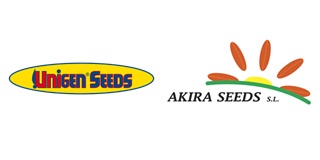
UNIGEN SEEDS SPAIN
HDPE film packaging can extend postharvest life of radish while curing might have little but beneficial effects
To investigate the effects of packaging on the quality aspects of radish, Korean radish roots (Raphanus sativus L. var. Kwandong) were stored at 0?C after different packaging treatments such as keeping in: - paper cartoon box (control), - keeping in plastic crates (PC), - packaging with micro perforated HDPE film in PC (HDPE + PC), - curing followed by keeping in PC (Curing + PC), - and curing followed by packaging with micro perforated HDPE film in PC (Curing + HDPE + PC). The cured treatment consisted to allow to cure at room temperature (about 26?28?C) for one day using electric fans by arranging roots on a polyethylene sheet on the floor and then packaging treatments were applied. After the packaging treatment the samples were stored at 0?C in a large room at dark condition. This temperature was chosen as a recommended storage temperature for radish roots. Quality evaluations were carried out on 0, 30, 60, 90,
24 April, 2018
To investigate the effects of packaging on the quality aspects of radish, Korean radish roots (Raphanus sativus L. var. Kwandong) were stored at 0?C after different packaging treatments such as keeping in:- paper cartoon box (control), - keeping in plastic crates (PC), - packaging with micro perforated HDPE film in PC (HDPE + PC), - curing followed by keeping in PC (Curing + PC), - and curing followed by packaging with micro perforated HDPE film in PC (Curing + HDPE + PC). The cured treatment consisted to allow to cure at room temperature (about 26?28?C) for one day using electric fans by arranging roots on a polyethylene sheet on the floor and then packaging treatments were applied.?After the packaging treatment?the samples were stored at 0?C in a large room at dark condition. This temperature was chosen as a recommended storage temperature for radish roots. Quality evaluations were carried out on 0, 30, 60, 90, 110, and 130 days of storage.Weight losses of radish roots were remarkably lower (<3%) in both HDPE film packaged samples compared to that of control (10%) or without film (?18%). Values, whiteness index, total soluble solids, and flesh and skin firmness were better maintained in Curing + HDPE + PC treatment compared to other treatments. Lower color difference values were also found in this treatment. Both film packaged samples had lower scores of black spot, surface shrinkage, and fungal infection incidence which revealed significantly longer marketable periods. HDPE film packaged samples exhibited longer shelf life more than one and two months compared to control and unpacked samples, respectively. Results suggest that HDPE film packaging can extend postharvest life of radish while curing might have little but beneficial effects in maintaining the quality characteristics. To our knowledge, this is the first report on quality evaluation of Korean radish during an extended storage period simulating the Korean industrial practices. SourcesEffects of Packaging on Shelf Life and Postharvest Qualities of Radish Roots during Storage at Low Temperature for an Extended PeriodDulal Chandra,1,2 Jung-Soo Lee,1 Hyun Jin Choi,1 and Ji Gang Kim11Postharvest Technology Division, National Institute of Horticultural and Herbal Science, Rural Development Administration, 100 Nongsaengmyeong-ro, Iseo-myeon, Wanju-gun, Jeollabuk-do 55365, Republic of Korea2Department of Horticulture, Faculty of Agriculture, Bangabandhu Sheikh Mujibur Rahman Agricultural University, Salna, Gazipur 1706, BangladeshJournal of Food Quality,?Volume 2018 (2018), Article ID 3942071, 12 pageshttps://doi.org/10.1155/2018/3942071Picture by?Agro Atlas








